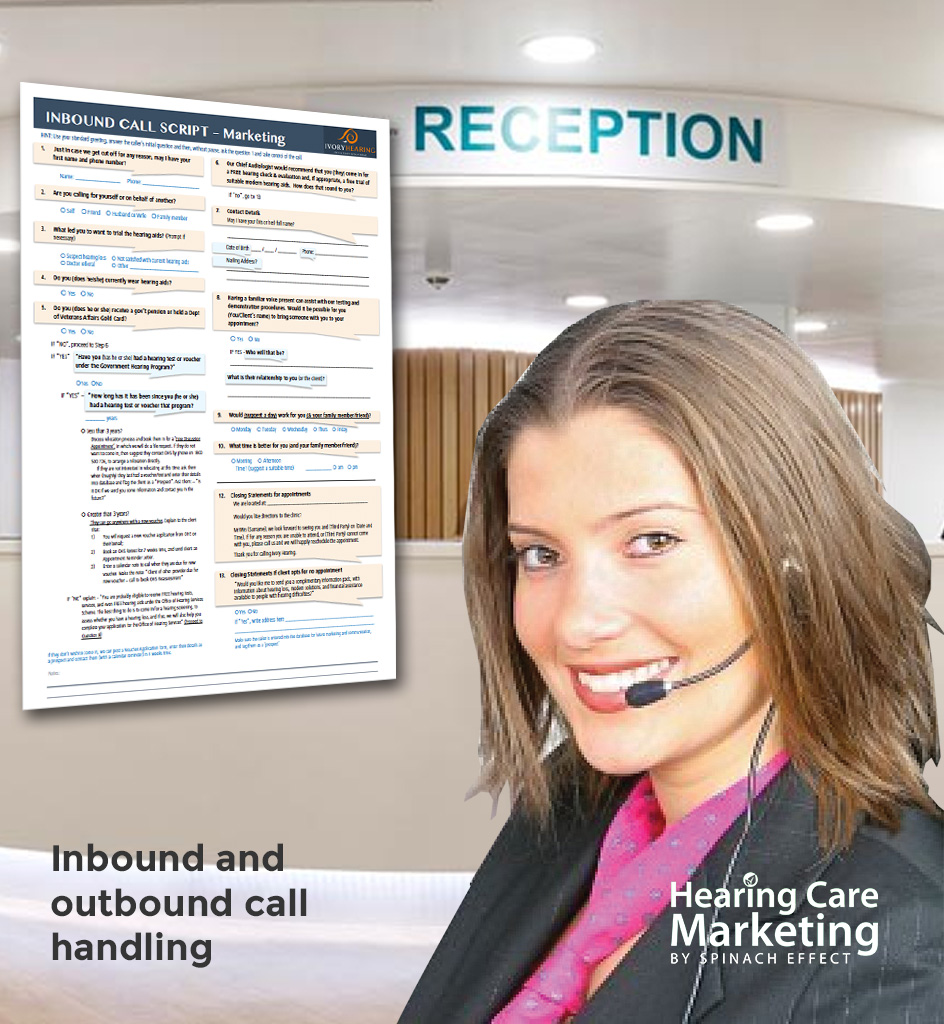Phone handling techniques and training
Don't blow opportunities on that first call!
The success of any marketing campaign for a hearing care provider should NOT be measured by how many leads or calls we generate. It must be measured in appointments, conversions, and sales.
It is never enough to get the phone to ring. The importance of managing that first contact with a prospective client cannot be overstated.
Our Director, Simon Hammond, has help build numerous Call Centers during his career and feels that this area rarely gets the focus it deserves:-
“A Receptionist or Call Center Operator, who is trained and armed with the right tools will convert 3 to 4 times more calls into appointment from marketing campaigns… think about that in terms of marketing Return on Investment… There is no point spending a cent on lead generation if we’re just going to blow opportunities when they come in.”
It can cost up to $150.00 to generate each phone call in response to a marketing campaign. Given this, we must do everything possible to convert these phone calls into appointments, or at the very least gain the contact details of the caller for future communication.

What is the real motivation of the potential client on the other end of the call?
Untrained customer service staff will often use phrases like:- “They were just calling for a price…” More often than not, this is missing the point.
People who have not adopted hearing solutions
Nobody really wants to wear a hearing aid and they’ve often lived with hearing loss for years before taking the step to call. But, they’re dipping their toe into the water and will just as quickly find an excuse to not adopt a hearing solution, as they will to take the next step. We need to help them and bring them along. It is in their best interests!
So, if your Hearing Care Professionals offer a range of treatments and solutions, giving a price on ‘Product A’ is never where a call should ever end.
Experienced hearing aid wearers
It is safe to assume that experienced hearing aids who call with an enquiry are generally unsatisfied with their current treatment and hearing solutions. Therefore, there are many ways to help this person beyond just answering their initial question. They should see the Hearing Care Professional.
Types of phone scripts and tools
Inbound Calls
- Referrals
- Response to marketing campaigns
- Online directories and Google
- Walk-ins, and more.
Outbound
- Following up people with hearing loss tested using the Touchscreen Hearing Check
- Check-up appointments
- Website, social media, or email enquiries
- Following up on information sent to prospects, such as a Health & Hearing magazine, to try to encourage an appointment.
Understanding the goals for every enquiry
When answering calls, it is important that staff share our goals. These include:
- Schedule an appointment
- If the enquiry is not ready to make an appointment, we need to get every caller’s contact details to enable future communication. Rather than just asking for their contact details, offer to send them information of value, such as a Health & Hearing magazine.
- Encourage people, especially older Clients, to bring a family member or friend to their appointment
Use training to manage staff objections
Please expect the phrase ‘telephone script’ to evoke resistance from staff.
Common objections include: -
- “I don’t want to sound like a robot”
- “I say all those things anyway , just not in that order – so there is no reason to use it”
- “I don’t have the time to go through a script with all the other work that I have to do”
Such objections are understandable, natural… and, most of the time, wrong.
That being said, we need to bring staff with us rather than simply say:- “You need to do this!”
Employ an expert to deliver staff training
By investing in staff training, you will greatly enhance the success of your business.
Simon will deliver a 1-hour training session, either in-person or via video conference (depending on costs and number of staff that you want to train).
During the sessions, Simon will cover the following: -
- Explain the costs/benefits of “inbound and outbound call handling techniques” and desired outcomes.
- Explain the costs/benefits of following up people who have engaged with your business, but have not yet booked and appointment.
- Deliver, discuss, and adapt email and text message follow-ups.
- Walk through script and obtain buy-in through listening to their feedback and adjusting the inbound and follow-up scripts, as appropriate.
- Practice using scripts with role playing.
- Developing metrics that staff can use to monitor their own performance.
- Conduct 30-min follow-up sessions to track the use of scripts, adjust the scripts if necessary.
Contact us today!
To discuss your inbound and outbound call handling, call Simon on +61 449 215 344,request a free discussion appointment here (Phone, Skype, Zoom or MS Teams), or complete this contact form and we’ll be in touch very soon.

